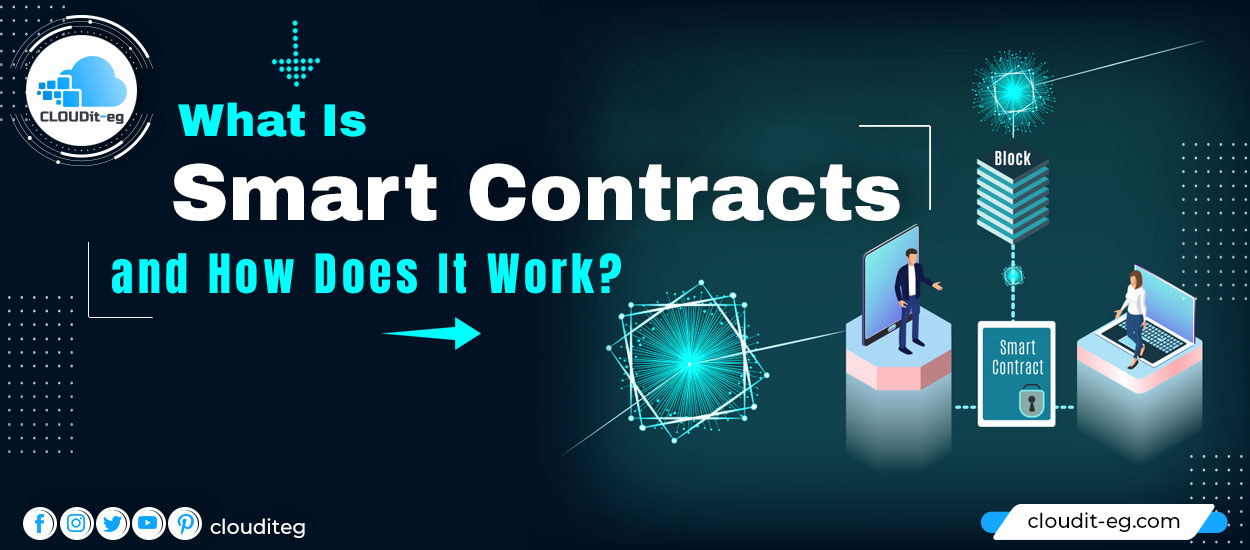Functionality & advantages of smart contracts in the blockchain simply explained
Distributed ledger technologies (DLT) are considered key technologies. In particular, blockchain technology is the focus of experts. This could optimize numerous processes in the future and focus on decentralization. Such a blockchain is a kind of decentralized and forgery-proof database. The use cases of such a register are diverse, but special attention on the part of the company is on the automation possibilities. With the help of smart contracts, companies can automate numerous processes and thus create added value.
What are smart contracts?
A smart contract, also known as an intelligent contract, is based on computer protocols. This is a kind of digital contract based on blockchain technology. The terms of the agreement between “buyer” and “seller” are written directly into lines of code. Smart contracts are self-executing contracts, which means that they come into force automatically in the event of certain previously defined events and therefore do not require any human supervision. If these entry conditions are met, the algorithm automatically initiates a transaction, which is then validated and stored in a block. Smart contracts thus enable the implementation of trustworthy transactions and agreements between different parties. These digital contracts can definitely be compared to traditional contracts – for example with a sales contract or the conclusion of an insurance policy. Since such an intelligent contract is processed without human intervention, typical sources of error can also be excluded.
Probably the best-known blockchain platform for developing these digital contracts is Ethereum. But with Tezos, a second blockchain is already available that provides extensive functions. The programming of such a contract can be processed using Solidity, a specialized programming language for Ethereum.
Are smart contracts legally binding?
A contract is an agreement between several parties. Accordingly, a contract always contains the legally binding declarations of intent of the contractual partners. In principle, contracts can be concluded in writing, orally, or through conclusive behavior. Due to legal certainty, contracting parties usually resort to a written form. As a result, such a contract must always contain the framework conditions in addition to the explicit naming of the contracting parties.
An intelligent contract is also based on this principle and contains relevant contract information. However, this information is already defined in the program code during development. The following applies to smart contracts: Code is the law. Put simply, such a contract is an if-then rule that contains all of the information required to conclude a contract.
How do smart contracts work technically?
Put simply, a smart contract is a small program that runs on a blockchain and executes simple if-then rules. The developers define conditions and actions in advance, which are then carried out automatically.
Intelligent contracts benefit from the blockchain and are transparent, irreversible, and traceable. Since these small programs are based on a blockchain, no intermediary can influence the processing. Rather, all transactions take place on the blockchain – this reduces costs. Thanks to decentralization, smart contracts work independently and have no time delays.
Within the distributed ledger, these digital contracts are treated as a separate account including a public address, without this account actually having one – and therefore nobody owns the private key. External access is excluded after creation. The contents of the contract are to be defined in the form of actions and conditions so that the account can execute these automatically. This allows it to connect to and interact with other accounts.
What are the special advantages?
Smart contracts offer several advantages over traditional forms of contract. These include:
- Security: Smart contracts are based on blockchain technology and are therefore secured using cryptographic encryption methods. Accordingly, no one can change the negotiated contractual terms retrospectively.
- Efficiency: The programming of a smart contract takes only a little time and then the processing takes place automatically. Classic forms of contract are more extensive both in terms of creation and processing so that automation saves time and money.
- Reliability: Correctly programmed smart contracts almost completely rule out any gaps in the interpretation of the terms of the contract. In addition, all documents are documented on the blockchain so that they cannot be lost.
- Decentralization: The decentralized organization of an intelligent contract means that third parties such as banks or notaries are not necessary. Instead, the blockchain takes over the validation of the transaction. The principle “Code is law” applies – the validity of the contract depends solely on the fulfillment of the contractual conditions.
What are the disadvantages of smart contracts?
Even if the advantages of these digital contracts are convincing at first glance, their concept is not yet fully developed. As a result, it is also possible that errors occur when using the programs. Due to the properties of the blockchain, already executed transactions are irrevocably documented on the blockchain. Subsequent correction is therefore no longer possible.
For example, a bug in a Decentralized Autonomous Organization (DAO) enabled the theft of 50 million US dollars on June 17, 2016. Due to the underlying error, the developers of the Ethereum blockchain had to carry out an update, which resulted in a hard fork, the separation of the actual blockchain. The direct result was the cryptocurrency Ethereum Classic, which was based on the split-off blockchain.
It is also possible for the developers to implement back doors in the program code. This fact shows that not only the underlying blockchain is relevant, but trustworthy developers are necessary. Ultimately, a functioning internet connection is required to execute a smart contract. Currently, this requirement cannot be met worldwide, so that technology cannot be used worldwide.
What can smart contracts be used for?
The use cases of blockchain-based contracts are almost endless. For this reason, we would like to focus on a narrower selection of possible use cases.
- Real estate: Digital contracts can define and regulate tenancies. A smart contract could automatically lower or raise the rental price – depending on the market value of the property or the agreement in the rental agreement. It is also possible that these will change the buying and selling of real estate permanently.
- Insurance: Through the use of intelligent contracts, insurance companies can process claims automatically and thus sustainably reduce costs. In addition, relevant information on the insured event can be transparently and irreversibly documented on the underlying blockchain in this way. As part of travel insurance, a smart contract could, for example, monitor flight data and transfer the corresponding compensation directly in the event of a flight delay.
- Supply Chains: Modern supply chains are complex and contain several contracting parties. In addition to the manufacturer and its suppliers, middlemen, producers, and consumers also belong in the supply chain. With the help of digital contracts, the contracting parties can cooperate on a common basis. The blockchain also enables the product to be tracked transparently.
- Licensing: Another option for using intelligent contracts is to issue software licenses. By using the programs, software developers can contractually define that the software is automatically blocked in the event of unauthorized access.
How are smart contracts programmed?
The programming of smart contracts can be carried out using the contract-oriented programming language Solidity. This programming language can be used with various blockchains. When Solidity was introduced, the programming language only worked on the Ethereum blockchain. Developers can now use this programming language to develop intelligent programs for various DLTs.
Developers only need a browser for programming. A corresponding client is required for the subsequent compilation of the code. Basically, Solidity’s syntax is similar to ECMAScript. It is also a deterministic language that rules out random events. After the actual program has been executed, the transaction is verified using the nodes in the network.
Conclusion
Unsurprisingly, smart contracts are considered one of the most important features of blockchains. With the help of these small programs, contracts can be fully automated. In addition, these programs offer a high level of legal security so that attacks are almost impossible.
From a company perspective, the functions are quite interesting. Insurance companies, financial service providers, and utilities, in particular, can benefit from using the technology. However, at the moment there are still a few examples that illustrate a successful use.




